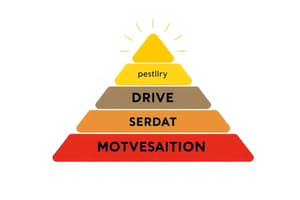Podcast
Questions and Answers
Which school of thought emphasizes the role of instincts in human motivation?
Which school of thought emphasizes the role of instincts in human motivation?
- Drive Reduction Theory
- Optimum Arousal Theory
- Evolutionary Theory (correct)
- Cognitive Theory
What is the primary focus of Drive Reduction Theory?
What is the primary focus of Drive Reduction Theory?
- Achieving a state of maximum arousal
- Satisfying social needs
- Motivation arising from internal drives and needs (correct)
- Understanding cognitive processes
According to Maslow's Hierarchy of Needs, which type of need must be fulfilled first?
According to Maslow's Hierarchy of Needs, which type of need must be fulfilled first?
- Safety needs
- Self-esteem needs
- Love needs
- Physiological needs (correct)
In Incentive Theory, what is meant by 'positive reinforcement'?
In Incentive Theory, what is meant by 'positive reinforcement'?
Which level of Maslow's Hierarchy addresses personal achievement and recognition?
Which level of Maslow's Hierarchy addresses personal achievement and recognition?
What motivates people to engage in activities such as visiting an amusement park according to the Optimum Arousal Theory?
What motivates people to engage in activities such as visiting an amusement park according to the Optimum Arousal Theory?
What is a key characteristic of Incentive Theory?
What is a key characteristic of Incentive Theory?
Which factor is NOT a part of the Incentive Theory as described?
Which factor is NOT a part of the Incentive Theory as described?
What are the three components of the ABC model of attitude?
What are the three components of the ABC model of attitude?
Which of the following best describes the theory of planned behavior?
Which of the following best describes the theory of planned behavior?
In the prototype willingness model, which factor does NOT affect behavior?
In the prototype willingness model, which factor does NOT affect behavior?
Which component of the ABC model does the statement 'I will go to class each week' represent?
Which component of the ABC model does the statement 'I will go to class each week' represent?
What differentiates the central route from the peripheral route in the Elaboration Likelihood Model for Persuasion?
What differentiates the central route from the peripheral route in the Elaboration Likelihood Model for Persuasion?
How does the attitude to behavior process model primarily determine behavior?
How does the attitude to behavior process model primarily determine behavior?
What is an example of a subjective norm in the theory of planned behavior?
What is an example of a subjective norm in the theory of planned behavior?
Which statement best describes the affective component of an attitude?
Which statement best describes the affective component of an attitude?
What is the primary focus of attribution in the context of behavior?
What is the primary focus of attribution in the context of behavior?
What does the concept of consistency imply regarding behavior?
What does the concept of consistency imply regarding behavior?
In the psychoanalytic theory, which of the following drives is associated with motivation for survival and pleasure?
In the psychoanalytic theory, which of the following drives is associated with motivation for survival and pleasure?
What happens if a person is fixated at the oral stage of psychosexual development?
What happens if a person is fixated at the oral stage of psychosexual development?
Which defense mechanism involves projecting one's feelings of inadequacy onto another person?
Which defense mechanism involves projecting one's feelings of inadequacy onto another person?
What is the term for the process of inferring causes for events or behaviors?
What is the term for the process of inferring causes for events or behaviors?
What aspect of behavior does distinctiveness refer to in attribution theory?
What aspect of behavior does distinctiveness refer to in attribution theory?
According to Freud's theory, which of the following is not a defense mechanism?
According to Freud's theory, which of the following is not a defense mechanism?
What does the foot-in-the-door phenomenon illustrate?
What does the foot-in-the-door phenomenon illustrate?
Which concept describes how people's roles can influence their attitudes over time?
Which concept describes how people's roles can influence their attitudes over time?
What is cognitive dissonance primarily concerned with?
What is cognitive dissonance primarily concerned with?
Which of the following is NOT a method to reduce cognitive dissonance?
Which of the following is NOT a method to reduce cognitive dissonance?
According to the situational approach of behavior in social psychology, what is emphasized?
According to the situational approach of behavior in social psychology, what is emphasized?
What happens when people face cognitive dissonance?
What happens when people face cognitive dissonance?
Which statement exemplifies justification of effort?
Which statement exemplifies justification of effort?
Which of the following best describes public declarations in the context of behavior and attitude change?
Which of the following best describes public declarations in the context of behavior and attitude change?
What is the correct order of needs in Maslow's hierarchy?
What is the correct order of needs in Maslow's hierarchy?
According to Carl Rogers, what two conditions are necessary for growth?
According to Carl Rogers, what two conditions are necessary for growth?
Which statement best describes self-actualization according to the content?
Which statement best describes self-actualization according to the content?
What does the term 'self-concept' refer to?
What does the term 'self-concept' refer to?
What does the biological theory suggest about personality?
What does the biological theory suggest about personality?
Which theorist proposed a link between extroversion levels and the reticular formation?
Which theorist proposed a link between extroversion levels and the reticular formation?
Which brain system is associated with personality according to Jeffrey Alan Gray?
Which brain system is associated with personality according to Jeffrey Alan Gray?
What is the consequence of a discrepancy between conscious values and unconscious true values?
What is the consequence of a discrepancy between conscious values and unconscious true values?
Which part of the mind is responsible for immediate gratification?
Which part of the mind is responsible for immediate gratification?
At what age does the superego typically begin to develop?
At what age does the superego typically begin to develop?
What is the role of the ego in the mind's structure?
What is the role of the ego in the mind's structure?
Which term describes a moment of mental conflict, such as a slip of the tongue?
Which term describes a moment of mental conflict, such as a slip of the tongue?
According to humanistic theory, what is the basic motive of all people?
According to humanistic theory, what is the basic motive of all people?
How does humanistic theory primarily differ from Freud's psychoanalytic theory?
How does humanistic theory primarily differ from Freud's psychoanalytic theory?
What occurs when there is an over-gratification or inadequate gratification of libido impulses?
What occurs when there is an over-gratification or inadequate gratification of libido impulses?
Which of the following describes the ego's function within the mind's structure?
Which of the following describes the ego's function within the mind's structure?
Flashcards
Evolutionary (Motivation)
Evolutionary (Motivation)
The theory that our basic instincts, like eating, sleeping, and crying, are innate and drive our behavior.
Drive Reduction Theory
Drive Reduction Theory
This theory states that we are motivated to reduce internal drives created by unmet needs. For example, thirst drives us to seek water.
Optimal Arousal Theory
Optimal Arousal Theory
The idea that we are motivated to reach a certain level of arousal or excitement. This explains why people seek out activities like thrill rides or sports.
Cognitive Motivation
Cognitive Motivation
Signup and view all the flashcards
Maslow's Hierarchy of Needs
Maslow's Hierarchy of Needs
Signup and view all the flashcards
Incentive Theory
Incentive Theory
Signup and view all the flashcards
Positive Reinforcement
Positive Reinforcement
Signup and view all the flashcards
Negative Reinforcement
Negative Reinforcement
Signup and view all the flashcards
Attitude
Attitude
Signup and view all the flashcards
ABC Model of Attitude
ABC Model of Attitude
Signup and view all the flashcards
Theory of Planned Behavior
Theory of Planned Behavior
Signup and view all the flashcards
Attitude to Behavior Process Model
Attitude to Behavior Process Model
Signup and view all the flashcards
Prototype Willingness Model
Prototype Willingness Model
Signup and view all the flashcards
Elaboration Likelihood Model for Persuasion
Elaboration Likelihood Model for Persuasion
Signup and view all the flashcards
Central Route of Persuasion
Central Route of Persuasion
Signup and view all the flashcards
Peripheral Route of Persuasion
Peripheral Route of Persuasion
Signup and view all the flashcards
Attribution
Attribution
Signup and view all the flashcards
Consistency
Consistency
Signup and view all the flashcards
Distinctiveness
Distinctiveness
Signup and view all the flashcards
Consensus
Consensus
Signup and view all the flashcards
Psychoanalytic Theory
Psychoanalytic Theory
Signup and view all the flashcards
Libido
Libido
Signup and view all the flashcards
Fixation
Fixation
Signup and view all the flashcards
Projection
Projection
Signup and view all the flashcards
Principle of Aggregation
Principle of Aggregation
Signup and view all the flashcards
Foot-in-the-Door Phenomenon
Foot-in-the-Door Phenomenon
Signup and view all the flashcards
Role-playing
Role-playing
Signup and view all the flashcards
Cognitive Dissonance Theory
Cognitive Dissonance Theory
Signup and view all the flashcards
Trivialize Cognitive Dissonance
Trivialize Cognitive Dissonance
Signup and view all the flashcards
Add Cognitions
Add Cognitions
Signup and view all the flashcards
Situational Approach
Situational Approach
Signup and view all the flashcards
Public Declarations
Public Declarations
Signup and view all the flashcards
Biological Theory of Personality
Biological Theory of Personality
Signup and view all the flashcards
Reticular Activation System (RAS) Theory
Reticular Activation System (RAS) Theory
Signup and view all the flashcards
Eysenck's Theory of Extroversion
Eysenck's Theory of Extroversion
Signup and view all the flashcards
Gray's Reinforcement Sensitivity Theory
Gray's Reinforcement Sensitivity Theory
Signup and view all the flashcards
Cloninger's Biosocial Model
Cloninger's Biosocial Model
Signup and view all the flashcards
Self-Actualization
Self-Actualization
Signup and view all the flashcards
Genuineness
Genuineness
Signup and view all the flashcards
Acceptance
Acceptance
Signup and view all the flashcards
Id
Id
Signup and view all the flashcards
Ego
Ego
Signup and view all the flashcards
Superego
Superego
Signup and view all the flashcards
Id, Ego, Superego Conflict
Id, Ego, Superego Conflict
Signup and view all the flashcards
Freudian Slip
Freudian Slip
Signup and view all the flashcards
Humanistic Theory (Carl Rogers)
Humanistic Theory (Carl Rogers)
Signup and view all the flashcards
Actualizing Tendency (Self-actualization)
Actualizing Tendency (Self-actualization)
Signup and view all the flashcards
Determinism (Freud)
Determinism (Freud)
Signup and view all the flashcards
Study Notes
Motivation Schools of Thought
- Evolutionary: Basic instincts (e.g., eating, sleeping) drive motivation.
- Drive Reduction: Needs (e.g., thirst) create drives (e.g., thirst). Drive reduction satisfies needs.
- Optimum Arousal: People seek optimal arousal levels (e.g., amusement park).
- Cognitive: Thoughts and processes drive behaviour.
- Maslow's Hierarchy: Needs are satisfied in a specific order (physiological, safety, love, esteem, self-actualisation).
Maslow's Hierarchy of Needs
- Pyramid: Needs must be satisfied from bottom to top.
- Physiological: Food, water, breathing.
- Safety: Employment, health, resources.
- Love/Belonging: Intimacy, family.
- Esteem: Confidence, achievement, respect.
- Self-Actualization: Reaching potential.
Incentive Theory
- Reward: Positive reinforcement motivates behaviour.
- Meaning: Associating positive outcomes with behaviour.
- Intangible/Tangible: Promotion, job satisfaction.
- Immediate/Delayed: Immediate rewards increase the likelihood of repeating behaviour.
Biological and Sociocultural Factors - Food, Sex, and Drugs
- Food: Hypothalamus regulates hunger and satiety. Insulin and leptin signals influence intake.
- Sex: Biological stages (excitement, plateau, orgasm, resolution) involve testosterone.
- Drugs: Biochemical factors, genetics, and stress influence drug use.
- Biologically/Socio-culturally: Family history/genetics, withdrawal cravings and biochemical factors.
Components of Attitude
- Learned: Evaluative tendencies toward objects, people, and events.
- Affective: Emotional feelings.
- Behavioural: Actions toward the attitude target.
- Cognitive: Beliefs/thoughts associated with the target.
Attitudes Influence Behaviour
- Theory of Planned Behaviour: Intentions influence behaviour based on attitudes, subjective norms, and perceived behavioural control.
- Attitude-to-Behaviour Process Model: Attitude and outside knowledge affect behaviour.
- Prototype Willingness Model: Past behavior, attitudes, subjective norms, and intentions motivate behaviour.
- Elaboration Likelihood Model: Persuasion can be processed by central route (logical) or peripheral route (emotional).
Behaviour Influences Attitude
- Foot-in-the-Door: Agreeing to small requests increases likelihood of agreeing to larger ones.
- Role-playing: Adopting a role can influence attitude.
- Cognitive Dissonance: Conflicting attitudes induce discomfort, leading to attitude change.
- Situational Approach: Behaviour is influenced by the situation.
Theories of Personality
- Psychoanalytic Theory: Focuses on the unconscious mind and early childhood experiences.
- Humanistic Theory: Highlights inherent goodness, self-actualization, and subjective experience.
Biological Theory
- Genetic Influence: Genes play a role in personality traits (e.g. social potency).
- Temperament: Inherited predisposition, influences behaviour.
- Brain Systems: Involved in various aspects of personality, e.g., reward, motivation, and impulsivity.
Studying That Suits You
Use AI to generate personalized quizzes and flashcards to suit your learning preferences.


